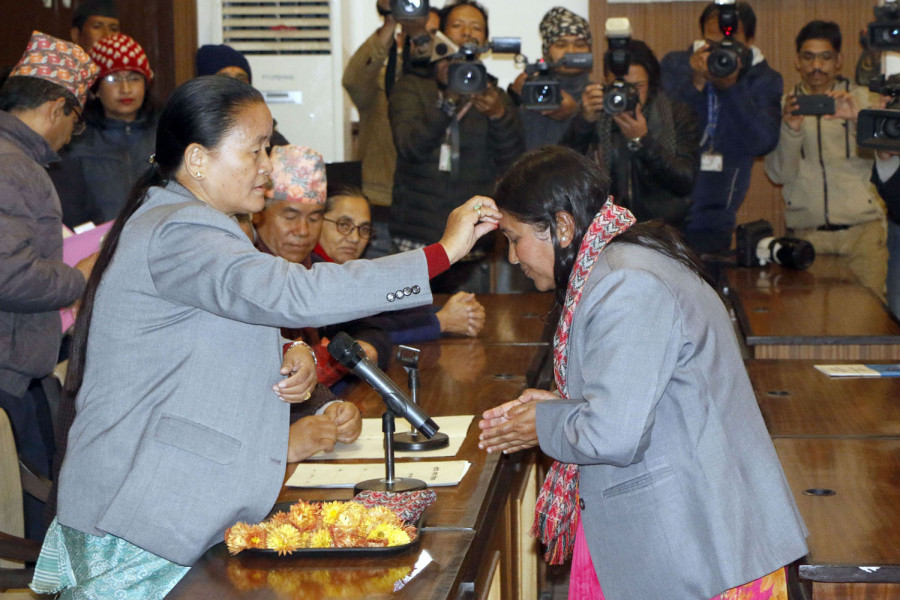Politics
Tumbahangphe courts controversy by administering the oath of office to Bidya Bhattarai
Only the Speaker of the House, not the deputy, is allowed to administer the oath to parliamentarians, party leaders and constitutional experts say.
Tika R Pradhan
Deputy Speaker Shiva Maya Tumbahangphe’s administration of the oath of office to a newly elected Member of Parliament has run into controversy, with leaders and constitutional experts questioning if she went beyond her brief and breached constitutional provisions.
Tumbahangphe administered the oath of office to Bidya Bhattarai, who was elected from Kaski Constituency 2 in the November 30 by-election, on Tuesday.
Since the resignation of Krishna Bahadur Mahara in early October after attempted rape allegations, the House of Representatives has been without the Speaker. The new Speaker will be elected on Friday when the winter session commences.
Ruling party leaders have questioned why Tumbahangphe rushed to administer the oath with the winter session of Parliament just three days away.
“Our constitution does not envision the Deputy Speaker playing all the roles of the Speaker in the latter’s absence,” said Ram Narayan Bidari, a ruling party leader. “It would be wrong to compare the role played by the Vice President in the absence of the President with that by the Deputy Speaker in the absence of the Speaker.”
Article 91 (4) of the constitution states that “the Deputy Speaker shall, in the absence of the Speaker, chair the House of Representatives”. According to Article 67 (2) of the constitution, the functions to be performed by the President shall be performed by the Vice President in the absence of the President.
Bhimarjun Acharya, an expert on constitutional affairs, said the rights provisioned by the constitution to the Speaker cannot be delegated to the Deputy Speaker.
“She can chair meetings of the House of Representatives but cannot exercise the authority designated to the Speaker,” Acharya told the Post. “She has already gone beyond her jurisdiction.”
This is not the first time that Tumbahangphe’s actions have run into controversy.
On December 11, her decision to recommend names for officials in the National Information Commission was challenged at the Supreme Court. The following day, the Supreme Court issued a show-cause notice and called the petitioner and defendant for a discussion on December 22.
A three-member recommendation committee, which is led by the Speaker and also includes the minister for communication and information technology as a member, recommends names for the information commission. In the absence of the Speaker, Tumbahangphe called a meeting of the recommendation panel on December 8 and recommended Mahendra Man Gurung as chief commissioner, along with Kamala Oli and Dipak Mainali as commissioners in the information commission. The Cabinet endorsed the recommendation on December 9.
Gopal Nath Yogi, secretary of the House of Representatives, however, said that the decision to administer the oath was taken as per Article 91 (4) of the constitution and Clause 75 of House of Representatives Member Election Act.
Clause 75 (1) of the Act states that any member of the House of Representatives must take an oath from whoever is “chairing” the House of Representatives before taking part in a meeting of the House or any parliamentary committee, as per the Schedule 3 of the Act.
Tumbahangphe is not currently chairing the House, as it is in recess, leading ruling party lawmakers and constitutional experts to argue that the oath could have been administered after electing the Speaker.
According to ruling party lawmakers, the obscurity of the constitutional provisions was up for discussion when Mahara was Speaker.
Mahara, in his capacity as Speaker, had also spoken about the difficulties he faced in terms of delegating authority to the Deputy Speaker in his absence.
“Mahara was in favour of introducing some changes in provisions to let the deputy play the roles he performs in his absence,” said Anjana Bishankhe, a lawmaker from the ruling party. “But those changes never materialised.”
Apart from concerns over the breach of constitutional provisions, some ruling party members are also asking whether Tumbahangphe was working at the behest of the party leadership while recommending names for the information commission and administering the oath.
As far as Bhattarai’s swearing-in is concerned, there was no need to hurry, said Bidari.
“Anyway, the House would have commenced its winter session in a matter of days,” Bidari, an advocate who is now a member of the National Assembly, told the Post. “I think the Parliament Secretariat buckled under pressure.”
Since Tumbahangphe has staked her claim to the post of Speaker, such controversial moves may not bode well for her.
The leadership does not appear keen on letting her lead the House and is planning to ask her to resign in return for a ministerial berth. Tumbahagphe, however, has said that she won’t resign.
More than an individual and their aspirations, such moves are not good for the revered positions they hold, say legal experts.
“When questions have already been raised at the court regarding one move, the Deputy Speaker should not be repeating a similar mistake by performing the duties of the Speaker,” said Narayan Ghimire, an advocate.
“The Deputy Speaker has only two tasks to perform—chair the House meetings in the absence of the Speaker and accept the Speaker’s resignation, which she did when Mahara tendered his. That is parliamentary practice.”




 8.79°C Kathmandu
8.79°C Kathmandu














